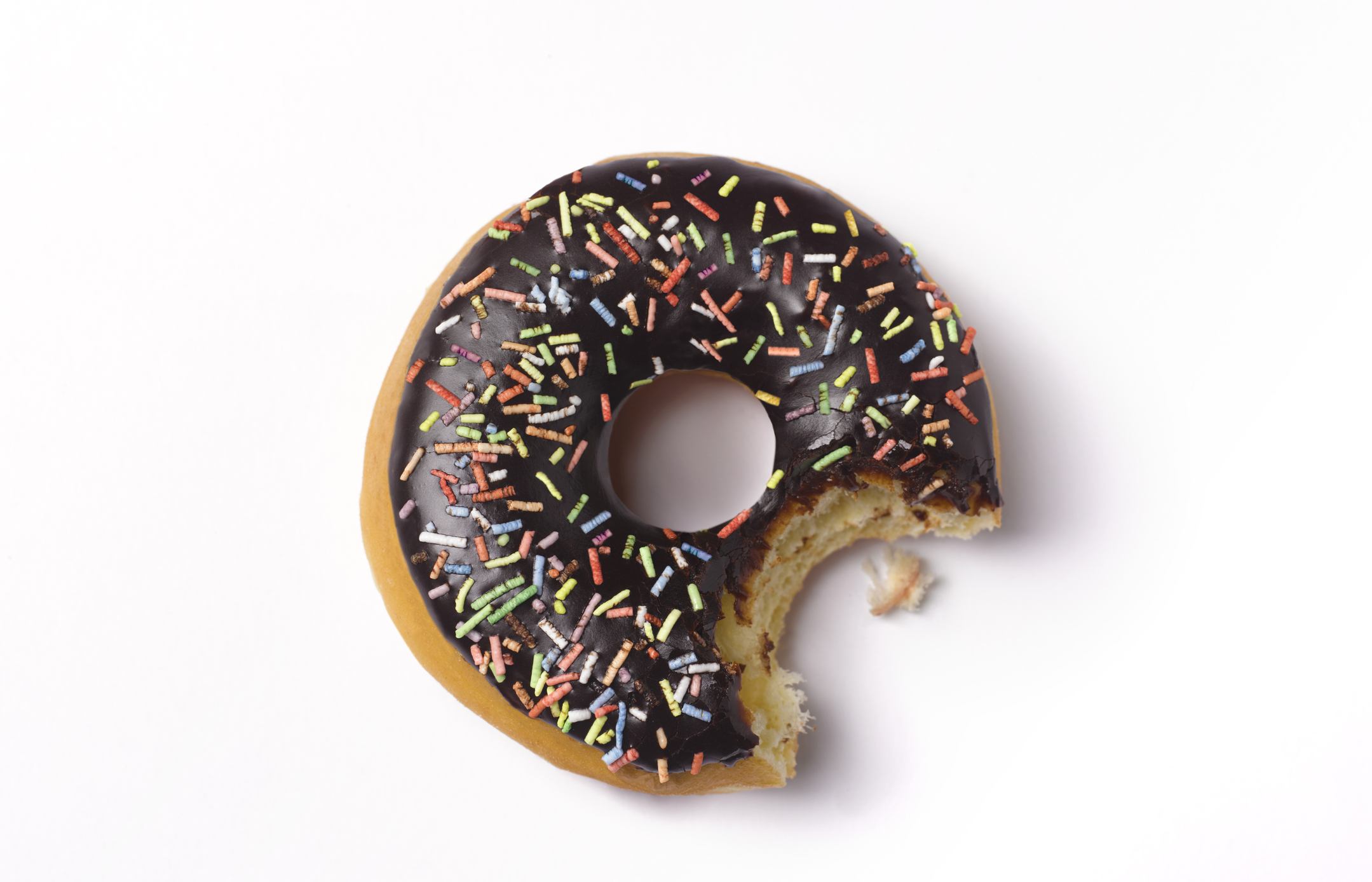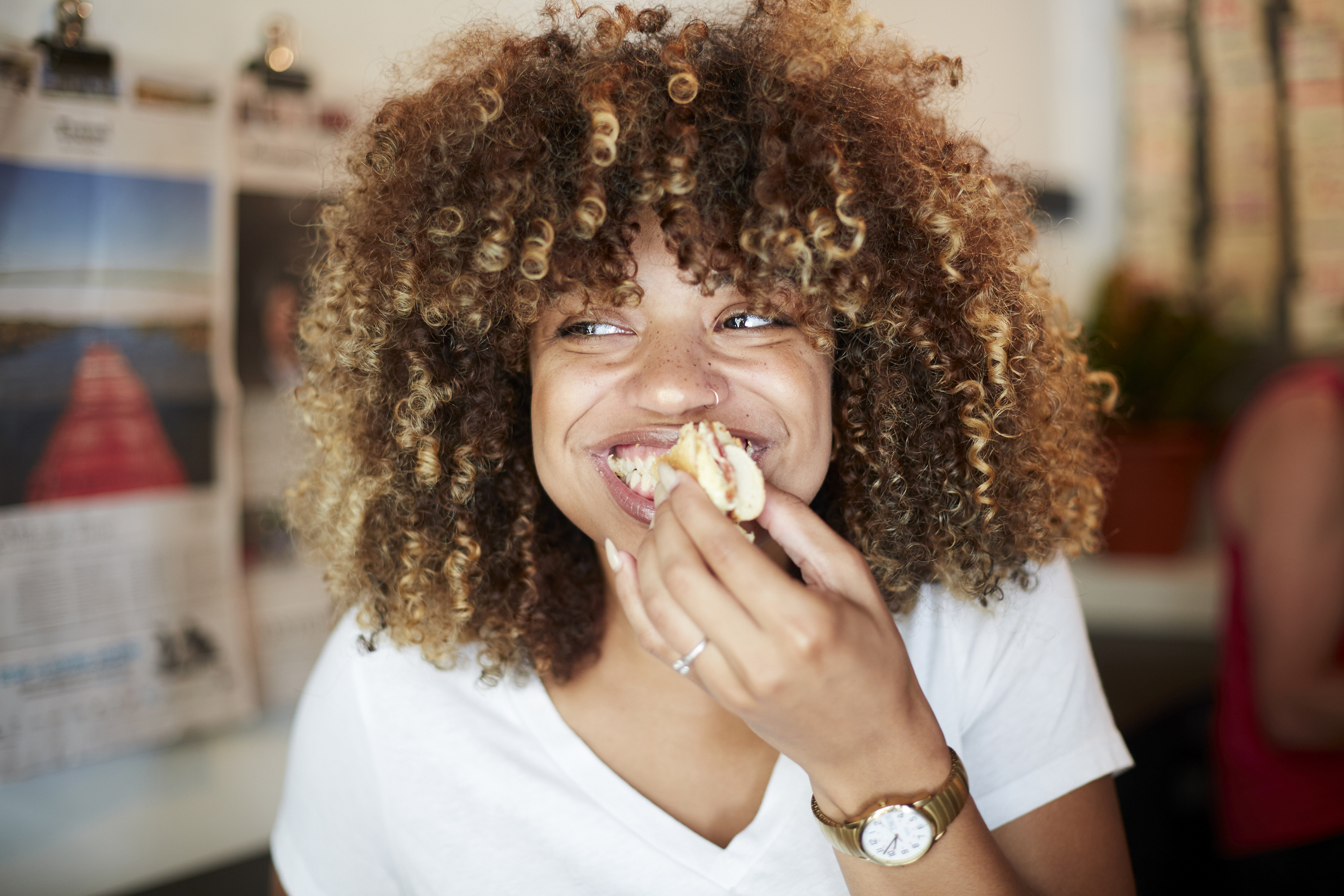
Celebrity news, beauty, fashion advice, and fascinating features, delivered straight to your inbox!
You are now subscribed
Your newsletter sign-up was successful
Demi Lovato says it helped them recover from disordered eating.
Search trends are spiking this month for intuitive eating - but have you ever heard of it and do you know what it means?
*Warning - article discusses themes of eating disorders which some readers may find triggering*
You may have heard pop singer and ED survivor Demi Lovato mention it in interviews, as they credit the approach, in part, for helping them to overcome anorexia and bulimia.
In short, intuitive eating describes getting back to a place where you eat if you're hungry - which many don't as they're keen to stick to a healthy "ideal" or nutrition plan. But ask yourself this - "if we are consumed with thoughts about what, when, and how much to eat, and literally running on empty - how can we tackle things like the climate crisis, capitalism, patriarchy, and white supremacy?," asks registered nutritionist and director of the London Centre for Intuitive Eating, Laura Thomas.
We've picked her brains on the definition of intuitive eating and how to adopt a more intuitive approach to nutrition yourself. Keep scrolling as she answers your questions - and don't miss our guides to mindful movement, self love, and diet fads, while you're here.
What is intuitive eating?
First things first: a definition for you.
Celebrity news, beauty, fashion advice, and fascinating features, delivered straight to your inbox!
"I like to think of intuitive eating as our default way of eating," shares Thomas. "As babies and young children, we have a good sense of when we’re hungry, what we want to eat, and how much of it we need to eat. We eat for pleasure: food brings us joy and we’re attuned to our bodies," she goes on.
But as we get older, our innate instincts around food are overridden. "We hear adults around us talk about their diets, how they hate their bodies, and how they must restrict themselves in order to fit into narrow body and beauty ideals."
As a result, Thomas argues that our ability to eat intuitively is overridden by a desire to eat in the same way Sally from Instagram is eating, or the way you think you should be eating. Moving back to a more intuitive form of eating simply means eating more foods you enjoy, working out what works for you, and making sure you listen to your body.
You'll likely be surprised that eating intuitively is better for your body and brain than following a strict or structured nutrition plan. Sure, strict black-and-white diets work for some, but not most. Think of it this way: if you cut out all sugar and restrict yourself, you'll likely think about it regularly and end up eating more - aka, bingeing - in social situations with sugar. On the other hand, if you eat cake when you fancy it, you'll actually end up eating a lot less, as you're not constantly obsessing over it and ultimately bingeing.

Where does the theory come from?
Good question. "Although it's recently blown up, intuitive eating was first developed by two registered dietitians in the 1990s," explains Thomas.
Evelyn Tribole and Elyse Resch developed ten principles that helped their clients "break away from the tyranny of dieting to reach food freedom," she continues.
That's the whole point of intuitive eating - to feel totally free around food and to find joy in both healthy and what are deemed not-so-nutrient-dense options. It's about working out what foods genuinely work for your body (and which don't that you enjoy) and approaching your health from a place of love, rather than hate.

Benefits of intuitive eating: 8 to know about
Did you know? Learning to eat more intuitively can benefit both our physical and psychological wellbeing, shares the nutritionist.
Benefits include:
- Improved mood
- Improved self-confidence
- Improved body image
- Improved self-love
- Higher life-satisfaction
- Can improve heart health
- Can improve blood glucose regulation
- Can help break the binge-restrict cycle.
Intuitive eating: your 5 step guide
Do note here: intuitive eating isn’t a quick fix and will take time to get right. "It can be tricky to unpack a lifetime of dieting and untether ourselves from what is ostensibly a coping mechanism," explains Thomas.
Also worth flagging: some of you may need professional support if you find yourself down, constantly thinking or worrying about food, or restricting certain food groups without a real medical reason to do so.
1. Notice the ways that diet culture is impacting you
As Thomas has mentioned, intuitive eating is a process and there are no shortcuts.
Try this: Start by beginning to notice the ways diet culture is impacting your lives and how much it’s living rent-free in your head, she advises. "Bring a gentle awareness to all the times you go for the rice cake over the cookie that you really wanted, or the times you convince yourself that you need to do that extra intense spin class when your body is screaming for rest."
2. Identify - and call out - negative self talk
Next up - try and notice when the voice in your head tries to make you feel guilty for nourishing your body.
"Begin to challenge the countless rules you may have around eating and move towards taking both joy and pleasure in food," she advises. This will actually help you to become less preoccupied with food and further, help reduce feelings of being out of control around food. "The more you restrict, the harder your body pushes back," Thomas explains.
3. Get rid of any triggers
If you find tracking apps, meal plans, or FitBits triggering, get rid of them, she advises. Yes, you can look after your body without tracking it.
"This opens up space to tune into what your body is actually asking for, instead of being dictated to by tech," Thomas shares. It also helps you to tune into your physical sensations around hunger, fullness, and enjoyment of foods.
4. Start to notice hunger
As above, starting to notice the subtle signs of hunger is one of the key components when it comes to eating intuitively.
Hunger signals include:
- Losing focus
- Losing concentration
- Dips in energy
- Feeling cranky.
5. Look after your body, rather than punishing it
Lastly, try and practice looking after your body with care - "like you would pets or children," Thomas explains.
"Instead of punishing your body with harsh exercise, strict food rules, and trash talk, know this: you deserve to be cared for no matter what your body looks like, no matter its physical ability, shape, or its size. Dress it in a way that’s comforting, nurture it with delicious food, and speak to it with tenderness," she concludes.

Ally is Marie Claire UK's Senior Health and Sustainability Editor, a well-regarded wellness expert, ten-time marathoner, and Boston Qualifying runner.
Utilising her impressive skillset and exceptional quality of writing, she pens investigative, review and first-person pieces that consistently demonstrate flair and originality.
As well as writing, Ally manages a team of freelancers, oversees all commissioning and strategy for her pillars, and spearheads the brand's annual Women in Sport covers, interviewing and shooting the likes of Mary Earps, Millie Bright, and Ilona Maher. Shortlisted for three BSMEs and winning one in 2022, Ally lives and breathes her verticals: her eye for a story and connections within the wellness sphere are unrivalled. Follow Ally on Instagram for more.
